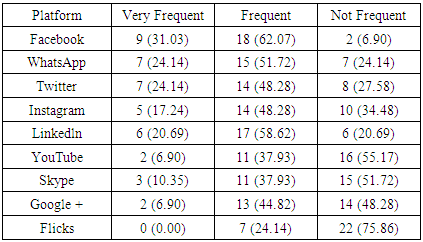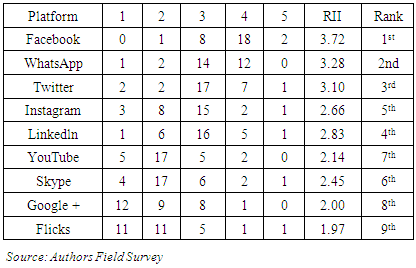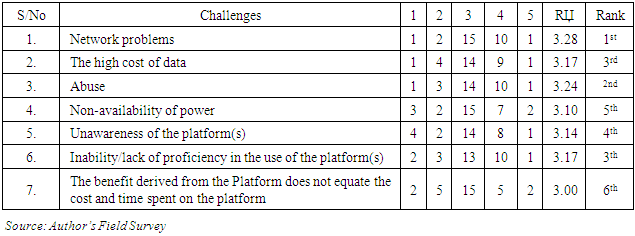-
Paper Information
- Paper Submission
-
Journal Information
- About This Journal
- Editorial Board
- Current Issue
- Archive
- Author Guidelines
- Contact Us
International Journal of Applied Sociology
p-ISSN: 2169-9704 e-ISSN: 2169-9739
2019; 9(1): 10-14
doi:10.5923/j.ijas.20190901.02

A Study of Social Media Usage among Estate Surveyors and Valuers in Real Estate Agency in Uyo, Nigeria
Okey Francis Nwanekezie1, Stanislaus Anabaraonye Okeahialam2
1Department of Estate Management, University of Uyo, Akwa Ibom State, Nigeria
2Department of Estate Management, Imo State University, Owerri, Imo State, Nigeria
Correspondence to: Okey Francis Nwanekezie, Department of Estate Management, University of Uyo, Akwa Ibom State, Nigeria.
| Email: |  |
Copyright © 2019 The Author(s). Published by Scientific & Academic Publishing.
This work is licensed under the Creative Commons Attribution International License (CC BY).
http://creativecommons.org/licenses/by/4.0/

The use of social media in our present society is phenomenal, and this work aims to examine its usage among estate surveyors and valuers (Real Property Practitioners) in Uyo, Akwa Ibom State, Nigeria. There was an enumeration survey of thirty-six (36) estate surveying and valuation firms in Uyo. The data were analyzed using simple percentages and relative importance index. In the study, it was found that all firms and their clients have made use of social media and that Facebook, WhatsApp, and Twitter are the most used social media by estate firms. The study also found that some of the challenges encountered by estate surveyors and valuers in their use of the social media platforms include network issues, the high cost of data, unawareness of the platform and non-availability of power, etc. It amongst other matters suggested the production of practice guidelines on the use of social media by relevant regulatory bodies and agencies.
Keywords: Social Media, Advertisement, Real Estate, Estate Surveyors, and Valuers, Agency
Cite this paper: Okey Francis Nwanekezie, Stanislaus Anabaraonye Okeahialam, A Study of Social Media Usage among Estate Surveyors and Valuers in Real Estate Agency in Uyo, Nigeria, International Journal of Applied Sociology, Vol. 9 No. 1, 2019, pp. 10-14. doi: 10.5923/j.ijas.20190901.02.
Article Outline
1. Introduction
- An integral part of real estate agency is the advertisement, and any successful transaction thrives mainly through it. Merriam-Webster dictionary describes it as a public notice especially one published in the press or broadcast over the air. Business dictionary sees an advertisement as public notices designed to inform and motivate, its objective being persuading the recipient so that he or she will take action desired by the advertiser. Eze (2005) also defines advertisement as the communication of a message to a particular target market, or audience, to influence this group to purchase a product or service or to accept an idea. One standard feature in the above definitions is the fact that advertisement is a public notice meant to achieve the desired goal.In marketing real estate product through advertisement, there are various media open to the practitioner. These include print media, broadcast or electronic media, outdoor media, and internet/digital media. Print media include newspapers, magazines, journals, particular issues publications and books. Real estate agents could choose the broadcast media which is mainly radio and television or select the outdoor media such as billboards, handbills, bus shelter posters, fly posters, big digital boards in squares/junctions, etc. Internet and digital media such as social media platforms provide another alternative to real estate agents in reaching the public with their product. In choosing any of the media, one needs to evaluate its efficiency and consider a range of factors such as the required coverage, the relative cost, and the media environment.The internet’s ability to narrowly target an advertising message and track user response to the advertiser’s message have continued to endear it to many Iroham, Ajibola and Durodola, 2015 and Aytekin and Keskin Demirli, 2017). It has the most comprehensive coverage among the various media of advertisement and relatively, it is the cheapest regarding cost. Given its availability in most mobile phones; it creates a suitable environment for its use over other media. One of the cheapest forms of internet facility is social media. Social media is a collective term for online advertising that focuses on social network services such as Facebook, Twitter, Instagram, Whatsapp, etc. Its emergence has revolutionized the information space, providing easy and cheap access to data and information. Both the government and private sectors have internalized their benefit. One of the characteristics of Real Estate market is fixity, but social media has made this history. With social media, it is now feasible to market a real estate product beyond its immediate local market boundaries in real time.Studies by Ayodele, Babagide, and Oluwatofunmi (2015), Babatunde, Ajayi, and Oladolun (2016), Shakede and Osasumwen (2016), Oyediji and Akindele (2017), and Babatunde and Ajayi (2018) have assessed and examined the usage of social media in real estate transactions in Lagos State (South-West Nigeria) with no similar studies in other regions or state. It is doubtful if real estate practitioners in Akwa Ibom State have also internalized the benefit of social media in their real estate marketing. Thus, this study is aimed at assessing the application of social media among real estate practitioners in Uyo, Akwa Ibom State.
2. Review of Related Literature
- Studies on information technology usage in real estate practice exist, but its application in marketing especially social media platform only took place recently (Babatunde et al. 2016). This section will review some of the available literature.Rodriguez (2011) in Texas, US considered the utilization of social media and it’s potential role in the real estate sales process. The author opined that the use of tools such as Facebook, Twitter or Linkedln cannot be ignored since 60% of Americans use social media. The paper also stated that adding a social media strategy is critical to doing business in today’s conversation-based economy, especially when prospecting in a challenging economy. The author further suggested that best practices in implementing social media in real estate should include indicating areas the media can help improve interaction within the real estate community, thinking differently about how they communicate with prospects and others in the community, engaging of clients in conversation via Twitter, blogs etc., and being patient when implementing a social media initiative. This paper is non-empirical in nature though quite relevant to the present study.Nwanekezie and Archibong (2013) in Eket, Akwa Ibom State examined the impact of information technology especially the usage of social media on property tax administration through a survey of a cross-section of 648 ratepayers and 21 rating authority staff. Using the Chi-square statistical tool for the hypotheses, the study found that the present property tax system in Eket is inefficient and that there is a relationship between information technology and property tax administration. The survey among other issues suggested the mobilization of political will in support of the implementation of information technology in property tax administration and phase by phase implementation. This study, though on information technology with bias on social media, is not on estate agency. However, its findings on the ability of social media to generate and increase support for paying taxes is relevant to the present study. Kendal (2014) in the United States examined social media's impact on real estate marketing using the tenets of Chaiken's Heuristic-Systematic Model (HSM) to the methods of persuasion employed by real estate agents via Facebook and Twitter. The study surveyed fifty (50) homeowners who had purchased a home within the past five years. The study found that the average Facebook and Twitter user is not the same as the real estate agent’s target client. Also that posts seen on Facebook and Twitter, specifically regarding the real estate market, are not engaging users systematically because their sufficiency threshold, is not called into question. The study also illustrated how applicable shelly Chaiken's theory and model of persuasion is when explaining the new and expanding field of social media marketing. The study suggested the engagement of customers by real estate agents on Facebook systematically. This study has examined only two social media platforms-Facebook and Twitter without consideration of other platforms. More so, real estate agents were not surveyed in the study to reveal the impact of social media on their practice. Besides, the sample population was not stated to determine the sample size; therefore, its findings may not be representative of the study area. Ayodele et al. (2015) in Lagos investigated the embrace of social media for property transactions among estate surveyors and valuers. The authors surveyed 194 estate surveying and valuation firms out of the 378 firms in Lagos. The study revealed that signboard and billboard is the most used and most effective marketing tool used by the respondents. Social media is second, and preparation of property bulletin and circulating the same in the form of hard copy among other colleagues and property consultants was ranked third. According to the study, Facebook is the most used form of social media followed by Twitter and YouTube, while the least used among estate surveying and valuation professionals in Lagos is snapchat. The study advocated for the review of various practice code by the Nigerian Institution of Estate Surveyors and Valuers (NIESV) and Estate Surveyors and valuers Registration Board of Nigeria (ESVARBON) to accommodate the current realities of social media to upgrade the real estate practice. The study collaborates the findings of Kendal (2014), but similar studies need to be conducted in other regions and states of the country to have a complete view of the impact of social media on real estate practice.Babatunde et al. (2016) in Lagos evaluated the level of use and the challenges faced in sharing information through social media by real estate practitioners. There was a sampling of a cross-section of 220 estate surveying and valuation firms in Lagos was sampled. The resultant data were analyzed using frequency distribution, percentages and mean ranking. The findings showed that virtually all estate practitioners make use of social media in real estate business transactions. The e-mail was found to be the most preferred medium, followed by phone calls, Facebook, property websites and bulk SMS. The study also revealed that the least used social media are YouTube and LinkedIn. The paper indicated that the highest ranked challenge in the use of ICT was service failure, followed by power failure and service cost. The article did not distinguish between social media platform and other information technology platform due to its merging with information technology. Shakede and Osasumwen (2016) in Ikeja, Lagos examined marketing strategies adopted by estate surveying and valuation firms in estate agency. The study conducted a total enumeration survey of thirty-two practicing firms in Ikeja and a simple percentage was used to analyze the resultant data. The study found that most of the estate firms used mainly print media in marketing their properties and occasionally, broadcast media. It also found that some of the firms faced problems in marketing their properties. The study advocated the employment of marketers in estate firms or the training of estate surveyors and valuers in the practice of marketing. The study did not examine the use of social media in these estate firms.In another marketing study in Ikeja, Lagos, Oyedji and Akindele (2017) examined estate marketing practices among estate surveyors and valuers. It sampled 64 registered estate surveying and valuation firms and descriptive statistics was used to analyze the data. It found that brochure or bulletin (print media) is the most common media of marketing in the area, followed by site/billboards and personal contact. It also revealed that collection of double professional fees and inducement in soliciting for briefs, constitute the worst challenges of estate marketing, in the study area. This study collaborate the findings of Shakende and Osasumwen (2016). Like most of the previous studies, it also failed to examine the usage of social media in marketing real estate products, despite the prevalence of ICT.Ojo, Oyetunji and Oyetunji (2018) investigated the barriers to deployment of ICT in Nigerian real estate practice in Lagos. It surveyed a cross-section of 172 estate firms and 516 clients of estate firms using stratified random and snowball sampling techniques. Weighted mean score (relative importance index) and sample t-test analysis were adopted to analyze the data. The study found that rapid changes in ICT technologies, difficulty in operation of some packages, high cost of implementing ICT networking, ineffective training in ICT etc., are some of the barriers to the deployment of ICT in real estate practice. It also reveals that ICT is applied in the area of real estate agency and marketing in the firms. The study has highlighted the general application of ICT in estate firms, without examining the application of social media.
3. Research Methodology
- This study is focused on the application/usage of social media platforms in the marketing or advertising of real estate by estate surveyors and valuers in Uyo. The population of estate surveying and valuation firms in Uyo as shown in the records of Akwa Ibom State branch of the Nigerian Institution of Estate Surveyors and Valuers is thirty-six (36), out of which twenty-nine (29) responded giving a response rate of 80.55%. Gathering of data was done by the questionnaire to get the required information/data. The resultant data were analyzed using simple percentages and relative importance index. The index is a 5-point scale with mid-point at 3. Thus an index that is less than 3.00 is not considered significant.
4. Presentation of Data/Discussion
- Here we present and discuss the data obtained. First, the researcher sought to know if the respondents have used social media in their property transactions and their responses are recorded in Table 1 below.
|
|
|
|
5. Conclusions and Recommendations
- This work had aimed at investigating the usage of social media platform by estate surveyors and valuers in Uyo in advertising and marketing of their real estate product. It concluded that estate surveyors and valuers in Uyo do make use of the various social media platform in advertising and marketing of their real estate product. Some of the used social media platforms include Facebook, WhatsApp, Twitter Instagram, LinkedIn, YouTube, Skype, Google+ and Flickr. It also concluded that Facebook, WhatsApp, and Twitter are the most used platform by estate surveyors and valuers in Uyo and also the most visited and patronized by their clients for information on real estate. The study further concluded that the use of social media platform by estate surveyors and values in Uyo is being challenged by network problems, high cost of data, unawareness of the platform and non-availability of power amongst others.An attempt at improving the challenges indicated in the study will no doubt help estate surveyors and valuers in Uyo to internalize the usefulness of social media. The professional body of estate surveyors and values in Nigeria – The Nigerian Institution of Estate Surveyors and Valuers, should come out with practice guidelines to minimize and eventually eliminate abuses of the platform.
 Abstract
Abstract Reference
Reference Full-Text PDF
Full-Text PDF Full-text HTML
Full-text HTML


